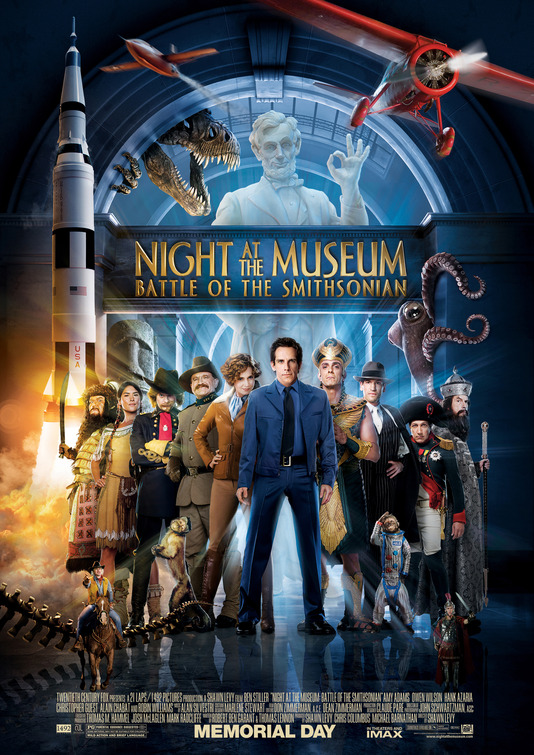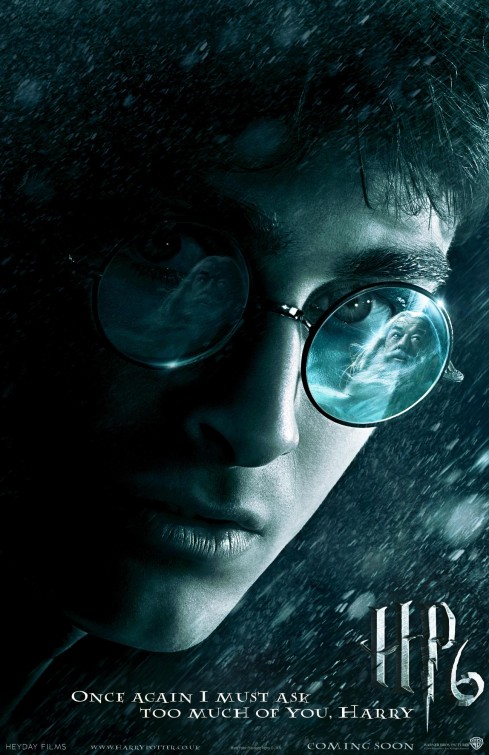
A Night at the Museum: Battle for the Smithsonian is more fun than a barrel of monkeys (not an easy feat since there are only two in the movie). It’s a sequel and one of those sequels that is better than the original. This is mainly due to a brilliant performance by Hank
Azaria as an even more fey Boris Karloff (if that’s possible) with a lisp so pronounced it’s like he has a tea kettle in his mouth. There is also crack comic timing from Ben Stiller (especially demonstrated in scenes with Jonah Hill and Ricky
Gervais) and a performance from Amy Adams as Amelia Earhart that screams star turn. Much of the success has to be attributed to the silly, but would you have it any other way, script by Robert Ben
Garant and Thomas Lennon (you know, the gay guy from I Love You, Man;
Garant also acts, the two play, appropriately enough, Orville and Wilbur Wright—if they can write a silly script, they can play people who designed a silly looking airplane). The downside of the film is that the two characters played by Owen Wilson and Steve
Coogan have nothing to do and proceed not to do it (there are times when they even seem to be reciting their lines like they’re embarrassed to be in a movie that only seems to be including them because they had such an indelible presence in the first one, but this is L.A. after all where the only thing more
unforgivable than failure is success).

Harry Potter and the Half Blood Prince is entertaining enough, though the most entertaining aspects of it are the characters showing they have more problems controlling their hormones than controlling their wands (I would say pun intended, but this is a family movie and the hormones never go below the neck). The three heroes who do little but fight off the evil
Voldomor must now fight off puberty; they find both a losing battle. The Harry Potter franchise has never been that exciting to me, so my views are probably irrelevant. But I always felt the plots were sort of clunky, almost as if the author J.K. Rowling was kind of winging it, making it all up as she went along and hoping nobody would notice (and based on ticket receipts, most people haven’t, so what does that say about me). It
doesn’t have the controlled and well thought out mythology of The Lord of the Rings, say. There is a wonderful performance (almost a redundant statement) by Jim
Broadbent as a quirky professor straight out of Goodbye, Mr. Chips and Tom Brown’s School Days. He first appears as an overstuffed armchair and even when he becomes human again, he still seems like an overstuffed armchair. His appearance is accompanied by a wonderful sequence in which a destroyed house gets put back together again, with one little bobble from a chandelier trying desperately to get out from under Harry Potter’s iconic tennis shoe to rejoin his mates. And two fun scenes: one in a shop where Ron
Weasley’s twin brothers have become wizard capitalists (in both senses of the word) and still won’t show their brother any respect (I guess, it’s not always who you know after all) and a kind of soccer game played on broomsticks (though they become unfortunately phallic at the worse times—but this is puberty after all, so it may be appropriate). The music by Nicholas Hooper is exciting and moving, especially over the end credits.
 A Night at the Museum: Battle for the Smithsonian is more fun than a barrel of monkeys (not an easy feat since there are only two in the movie). It’s a sequel and one of those sequels that is better than the original. This is mainly due to a brilliant performance by Hank Azaria as an even more fey Boris Karloff (if that’s possible) with a lisp so pronounced it’s like he has a tea kettle in his mouth. There is also crack comic timing from Ben Stiller (especially demonstrated in scenes with Jonah Hill and Ricky Gervais) and a performance from Amy Adams as Amelia Earhart that screams star turn. Much of the success has to be attributed to the silly, but would you have it any other way, script by Robert Ben Garant and Thomas Lennon (you know, the gay guy from I Love You, Man; Garant also acts, the two play, appropriately enough, Orville and Wilbur Wright—if they can write a silly script, they can play people who designed a silly looking airplane). The downside of the film is that the two characters played by Owen Wilson and Steve Coogan have nothing to do and proceed not to do it (there are times when they even seem to be reciting their lines like they’re embarrassed to be in a movie that only seems to be including them because they had such an indelible presence in the first one, but this is L.A. after all where the only thing more unforgivable than failure is success).
A Night at the Museum: Battle for the Smithsonian is more fun than a barrel of monkeys (not an easy feat since there are only two in the movie). It’s a sequel and one of those sequels that is better than the original. This is mainly due to a brilliant performance by Hank Azaria as an even more fey Boris Karloff (if that’s possible) with a lisp so pronounced it’s like he has a tea kettle in his mouth. There is also crack comic timing from Ben Stiller (especially demonstrated in scenes with Jonah Hill and Ricky Gervais) and a performance from Amy Adams as Amelia Earhart that screams star turn. Much of the success has to be attributed to the silly, but would you have it any other way, script by Robert Ben Garant and Thomas Lennon (you know, the gay guy from I Love You, Man; Garant also acts, the two play, appropriately enough, Orville and Wilbur Wright—if they can write a silly script, they can play people who designed a silly looking airplane). The downside of the film is that the two characters played by Owen Wilson and Steve Coogan have nothing to do and proceed not to do it (there are times when they even seem to be reciting their lines like they’re embarrassed to be in a movie that only seems to be including them because they had such an indelible presence in the first one, but this is L.A. after all where the only thing more unforgivable than failure is success). Harry Potter and the Half Blood Prince is entertaining enough, though the most entertaining aspects of it are the characters showing they have more problems controlling their hormones than controlling their wands (I would say pun intended, but this is a family movie and the hormones never go below the neck). The three heroes who do little but fight off the evil Voldomor must now fight off puberty; they find both a losing battle. The Harry Potter franchise has never been that exciting to me, so my views are probably irrelevant. But I always felt the plots were sort of clunky, almost as if the author J.K. Rowling was kind of winging it, making it all up as she went along and hoping nobody would notice (and based on ticket receipts, most people haven’t, so what does that say about me). It doesn’t have the controlled and well thought out mythology of The Lord of the Rings, say. There is a wonderful performance (almost a redundant statement) by Jim Broadbent as a quirky professor straight out of Goodbye, Mr. Chips and Tom Brown’s School Days. He first appears as an overstuffed armchair and even when he becomes human again, he still seems like an overstuffed armchair. His appearance is accompanied by a wonderful sequence in which a destroyed house gets put back together again, with one little bobble from a chandelier trying desperately to get out from under Harry Potter’s iconic tennis shoe to rejoin his mates. And two fun scenes: one in a shop where Ron Weasley’s twin brothers have become wizard capitalists (in both senses of the word) and still won’t show their brother any respect (I guess, it’s not always who you know after all) and a kind of soccer game played on broomsticks (though they become unfortunately phallic at the worse times—but this is puberty after all, so it may be appropriate). The music by Nicholas Hooper is exciting and moving, especially over the end credits.
Harry Potter and the Half Blood Prince is entertaining enough, though the most entertaining aspects of it are the characters showing they have more problems controlling their hormones than controlling their wands (I would say pun intended, but this is a family movie and the hormones never go below the neck). The three heroes who do little but fight off the evil Voldomor must now fight off puberty; they find both a losing battle. The Harry Potter franchise has never been that exciting to me, so my views are probably irrelevant. But I always felt the plots were sort of clunky, almost as if the author J.K. Rowling was kind of winging it, making it all up as she went along and hoping nobody would notice (and based on ticket receipts, most people haven’t, so what does that say about me). It doesn’t have the controlled and well thought out mythology of The Lord of the Rings, say. There is a wonderful performance (almost a redundant statement) by Jim Broadbent as a quirky professor straight out of Goodbye, Mr. Chips and Tom Brown’s School Days. He first appears as an overstuffed armchair and even when he becomes human again, he still seems like an overstuffed armchair. His appearance is accompanied by a wonderful sequence in which a destroyed house gets put back together again, with one little bobble from a chandelier trying desperately to get out from under Harry Potter’s iconic tennis shoe to rejoin his mates. And two fun scenes: one in a shop where Ron Weasley’s twin brothers have become wizard capitalists (in both senses of the word) and still won’t show their brother any respect (I guess, it’s not always who you know after all) and a kind of soccer game played on broomsticks (though they become unfortunately phallic at the worse times—but this is puberty after all, so it may be appropriate). The music by Nicholas Hooper is exciting and moving, especially over the end credits. 


No comments:
Post a Comment